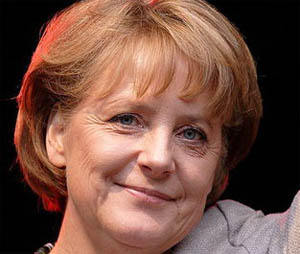FDP hope to hitch a ride into power on pro-Merkel vote
 Berlin - Germany's Free Democrats (FDP) have now languished in opposition for more than a decade. The pro-business party, led by Guido Westerwelle, hope the time has finally come for a return to power.
Berlin - Germany's Free Democrats (FDP) have now languished in opposition for more than a decade. The pro-business party, led by Guido Westerwelle, hope the time has finally come for a return to power.
The FDP has explicitly hitched its fortunes to Chancellor Angela Merkel's Christian Democrats (CDU), openly campaigning for a governing CDU-FDP coalition (black-yellow, after the party colours) after elections on September 27.
FDP leader Guido Westerwelle, who is on friendly terms with the chancellor, has made no secret of his desire to serve as foreign minister in a Merkel-led government.
Merkel's CDU, currently yoked to the Social Democrats (SDP) in an awkward grand coalition, has returned the compliment by expressing itself in favour of a so-called "bourgeois" coalition with the FDP.
In the wake of the financial crisis, Merkel has argued that economic growth is a priority which is best served by the CDU and FDP's broadly pro-business credentials.
However, the CDU's refusal to rule out a renewal of the grand coalition, should they not win enough votes to govern with the FDP, has stoked FDP's fears of a repeat of 2005.
At the time, the CDU fared worse than expected and the FDP's share of the vote - although up 2.5 per cent - was not enough to form a governing coalition.
Instead, the CDU-SPD coalition came into being, after Westerwelle snubbed an invitation to form a government with the SDP.
This time around, general expectations are for a nail-bitingly thin CDU-FDP majority.
Opinion polls give such a black-yellow coalition a combined total of 48-50 per cent of the vote, narrowly ahead of a so-called traffic light combination of SPD (red), FDP (yellow) and Greens.
A renewed grand coalition, on the other hand, would represent 56-59 per cent of the electorate, according to polls.
The FDP share of the vote has risen over the past eight years, as Westerwelle has experienced a surge in popularity.
Once ridiculed for appearing on the Big Brother reality TV show and touring the country in his "Guido-mobil" election campaign car, Westerwelle says he has learnt from past mistakes.
The 47-year-old lawyer, who now speaks openly about being gay, was reaffirmed at the helm of his party by an overwhelming majority earlier this year.
"(Westerwelle) is not really popular, but he is respected in the FDP and the broader population," said Ulrich von Alemann, a political scientist at the University of Dusseldorf, adding that Westerwelle had matured into the role of a statesman.
"Westerwelle is so firmly in the saddle as the head of the FDP that he would even survive a failure, say if the FDP didn't get into government," von Alemann added.
The FDP's growing appeal comes despite the fact that the economic crisis is being blamed on the free-market ideologies the party espouses.
"Many political experts are at a loss to explain this," von Alemann said.
The academic said many FDP voters were deserting the CDU camp as they disagreed with Merkel's more social, redistributive policies.
This internal swap of voters would not help increase the overall CDU-FDP share of the vote.
The FDP has traditionally been the kingmaker party, whose success lay in its strategic alliances. But the rise of the Greens - and more recently the Left Party - has splintered the political landscape.
Seen as the tax-cutting party, the FDP wants to introduce a simplified tax system of just three bands, starting with a marginal rate of 10 per cent.
Westerwelle says this would help relieve the country's debt burden, even if it brought just 10 or 20 per cent of an annual 350-billion-euros of unreported "black" labour back into the formal economy.
In addition, the FDP is campaigning to relieve small firms of employment protection obligations, institute free child care for the first 12 months and privatize Germany's healthcare system.
Westerwelle said the FDP's philosophy is "not to wait for the state to tell us how to become happy."
"All other parties in Germany trust first the state and then the citizens. Only the FDP places its trust in the citizens first, and then the state," Westerwelle said.
Whether the citizens place their trust in the FDP on September 27 probably depends on a figure outside the party: Angela Merkel. (dpa)